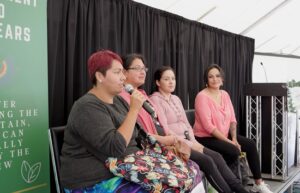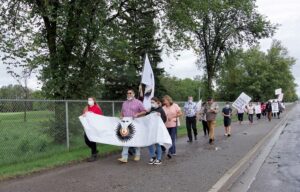Ka-Na-Chi-Hih Specialized Solvent Abuse Treatment Centre SAAFE Walk raises awareness of solvent abuse and treatment

By Rick Garrick
THUNDER BAY — The importance of healing circles for recovery was highlighted during the Pow Wow Rangers’s keynote presentation at the Sept. 16 Ka-Na-Chi-Hih Specialized Solvent Abuse Treatment Centre SAAFE Walk in Thunder Bay.
“Those healing circles are where our healing began, and being able to speak and use our voice and speak from our heart and be able to cry and to be okay with crying while sharing that because you’ve got to say it and be able to speak your truth and not keep it deep down in there,” says Khanena Nowegejick, a Pow Wow Ranger and Biigtigong Nishnaabeg citizen. “We got to learn to use our voice and share and say, ‘I’m proud to be [Anishinaabe].’”
Nowegejick says her connection with the Pow Wow Rangers was important for continuing on her healing path.
“That connection is so important,” Nowegejick says. “And you can do that from anywhere in your own community, you support each other, you just visit, you get together, and I think we need to start doing that again — COVID-19 kind of really just separated us. We need to be able to have circles, and it doesn’t even have to be a cultural thing, just a circle and to share and visit and have our children there so they can see us breaking these cycles.”
Janine Desmoulin, a Pow Wow Ranger and Biigtigong Nishnaabeg citizen, says the Pow Wow Rangers have played a crucial role in each other’s sobriety and healing.
“I’m honoured to be sitting with these women and I’m honoured to know them and their journeys,” Desmoulin says. “I’ve had ties to Ka-Na-Chi-Hih for a long time because I started here as a field placement worker and my first experience to learning about solvent abuse.”

Desmoulin says her family had a “hard year” with disconnection during the COVID-19 pandemic.
“I’ve had so many opportunities to work and pass on healing, [but] you forget sometimes to pass that healing on to yourself, you forget sometimes the roots, and all my roots were kind of pulled out during COVID because of my connection,” Desmoulin says. “Balance is important. I live in ceremony so much sometimes. We need that laughter, we need that balance, we need those things and with these women, I’ve got those things; a healthy balance, a lot of crying and snot, a lot of hugs.”
Crystal Morrison, a Pow Wow Ranger and Big Island citizen, says she is grateful for the relationship she had with the Pow Wow Rangers over the years, noting that she now lives in Kenora.
“It’s always going to be there, always no matter what,” Morrison says. “We’re all on our own separate paths and our own separate journeys and I’m just really grateful for our time spent here with tons of good people. My children have been my main priority and when I set my mind to making sure that I’m able to give them more than what I think I have, then I know I’m doing a good job.”
Kiaya Drake, a Pow Wow Ranger and Kiashke Zaaging Anishinaabek citizen, says the Pow Wow Rangers were formed one evening after a healing circle.
“It was with a bunch of women that really [were] missing that cultural connection,” Drake says. “We clearly wanted it to the point that we named ourselves after the Pow Wow Rangers and we don’t even Pow Wow. We get these beliefs that sobriety is boring like there is no fun, and they taught me that it is so fun, they taught me all the possibilities and the magical opportunities that come. It’s been so powerful, I’ve been able to get through so many difficulties in my sobriety — I’m five-and-a-half years sober today.”
The Ka-Na-Chi-Hih SAAFE Walk is held annually to raise awareness of solvent abuse and treatment.

